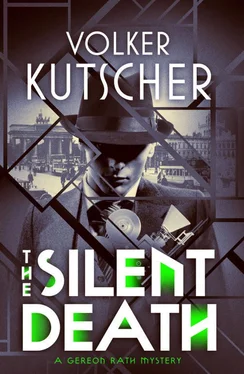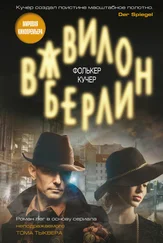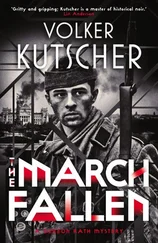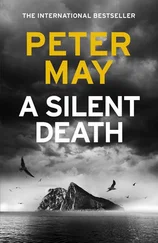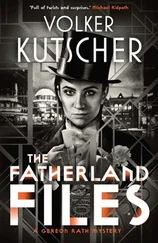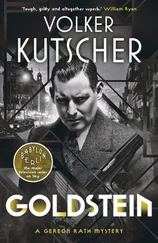His parents, whose spacious Klettenberg house he had crawled back to and remained at after Ash Wednesday because he couldn’t bear the carnival rumpus on the Cologne Ring, had behaved as if everything was normal. No, as if everything had been like it was before, when they all lived under the same roof. When they were still a family. Back then, before the war.
Mother had baked a cake, as she did each year for her children, and for Gereon it was always hazelnut cake. It was waiting on the breakfast table when he came downstairs, with Mother smiling expectantly. Father, of course, had long since left for the station. You had to be up early to bid Engelbert Rath good morning. The good son didn’t show his distaste when she planted a congratulatory kiss on his cheek and passed him the first rustling package. He dutifully opened his presents: a packet of cigars from Father, a hand-knitted scarf from Mother. Like every year, although he didn’t smoke cigars and never wore the woollens – except when he held the new present up against the mirror and said Lovely! He could never bring himself to tell Mother the truth, and Father certainly not, even as a child. Under Severin’s knowing gaze he had simply mumbled Lovely , whatever she pressed into his hand. That day, however, he was on his own. Even his sister Ursula wasn’t expected until the afternoon… but then she had to cancel because her stupid husband let her down, and she was stuck with the kids. It seemed fitting given how the day would pan out. No one had been in touch, not Doris, who had broken off their engagement, nor any of the boys, most of whom he had known since school. After the first article about the shoot-out in the Agnes quarter they no longer kept up with their monthly round of skat. Not even a telephone call. That’s it, he thought, the rest of the world has forgotten about you.
He was just coming to terms with all this when Paul came by in the evening and, for the first time in many weeks, Gereon dared to venture outside for more than half an hour. Paul, the only one from the skat group who had kept faith, shoved him into a waiting taxi and took him out to Rudolfplatz where they roamed the Ring, Cologne’s nightclub district. Moving from one bar to another they got good and drunk, the first time since the fatal shooting. He was still grateful to Paul for dragging him from his dark pit back into the light of day. To some extent the evening drinking session made up for the day gone by. Perhaps that was the only way to celebrate a birthday, by getting hammered enough to forget why you were drinking in the first place.
Rath went into the living room and put on a record. He lit a cigarette, drank his coffee and listened to the music in peace. How to begin the day? By sorting the Wessel file or by writing the report for Dr Weiss? What an enticing prospect! He decided to treat himself to breakfast at Josty in honour of the occasion, and went back into the bathroom to shave. ‘Happy Birthday,’ he said to his reflection, and began lathering his face.
Half an hour later he was sitting at a table with a view of Potsdamer Platz, a copy of Tageblatt in his hand, watching the grey sky gradually brighten over Leipziger Strasse. Weinert had written his article about the latest developments in the Winter case – in spite of the government crisis, to which he had devoted considerably more column inches. However, it wasn’t the article Rath had been expecting. With each line he grew more enraged. He folded the paper, took it into the mahogany-panelled telephone booth and called Nürnberger Strasse. Weinert answered, sounding rather drowsy.
‘What the hell is this?’ Rath asked without a word of greeting.
‘Give a guy a chance to wake up before you start abusing him.’
‘Abusing you? Look what you’ve written?’
‘What was I supposed to do? I called this Brenner, like you told me to, but he had a completely different perspective from you on all the main points. Besides, there was a press conference. The news that this lighting technician is wanted for murder isn’t only in Tageblatt. ’
‘I explained to you that the murderer most likely only took advantage of Krempin’s design, and that he must have known the production schedule and script…’
‘Gereon, you don’t have to tell me all that again! If the police issue an official statement I have to adhere to it, and they’re saying that Felix Krempin is being urgently sought in connection with the Winter case – they’re even offering a reward! If you read my article more closely, you’ll realise that Tageblatt is the only paper that presents its readers with an alternative sequence of events.’
‘You sound like your chief editor,’ Rath said. He unfolded his paper: ‘ The theory is not shared by all officers, however. According to our source, the fugitive Felix Krempin could be a thwarted saboteur, whose infernal machine was used by someone else to kill Betty Winter. Further insights are to be expected only once Krempin is found and makes a statement. Spectacular stuff!’
‘Sorry if you don’t like it, Gereon, but there wasn’t much else to say. You waited too long; your story wasn’t an exclusive anymore. Besides, it was you who told me that I shouldn’t mention your name.’
‘That would have capped it!’
‘You spoke to him didn’t you, Gereon?’
‘Pardon me?’
‘You spoke to Krempin, admit it!’
‘Why do you want to know?’
‘I have no idea what your connection is to this man, but if he’s innocent and wants to talk I would listen. As well as guaranteeing him one hundred percent anonymity and complete discretion. Is he really holed up in an allotment somewhere in Grunewald?’
‘You overestimate me. I have no idea where he’s hiding.’
‘I just wanted to let you know. He can trust me. Tell him the next time you speak to him.’
‘See you at lunchtime.’ Rath hung up.
He didn’t make it into the Castle until about nine, only to find the office deserted. Had Böhm stood Erika Voss down too? Rath got straight to work, filing the twelve pages of Gräf’s report with the rest of the reports on the Wessel funeral, which, among other things, he had requested from the political police. Böhm wanted the case to be treated as a straight murder, and everything political ignored – which was nigh on impossible given the reports on the victim’s burial. The Nazis had turned it into a kind of state funeral, and the Communists had disrupted it by denouncing the victim as a pimp. Reading Gräf’s report, Rath thought he discerned a certain sympathy for the Nazis at having to endure the abuse of the Red mob. They had conferred martyrdom on the dead man, while the Reds derided him as a ponce.
Rath took less than an hour to log everything, but, having finished, felt no desire to run straight to Böhm with the files. Better to wait until Voss got in and assign the task to her. He made a start on Weiss’s report. It wasn’t so easy to put his quarrel with Brenner into words, he discovered, as he searched for the most neutral way to phrase things. He could hardly write: Detective Inspector Brenner grievously insulted my erstwhile lover, homicide stenographer Charlotte Ritter, with the result that I saw myself obliged to restore the lady’s honour, but not without first having warned the detective against continuing with his affronts. When, however, Brenner refused to see reason and persisted with his slander, I was left with no choice but to prevent him by force.
He wrote the sentences anyway, as something to build on and edit until it was close enough to the truth without exposing Charly.
There was a knock on the door. Rath cursed his secretary. Did he have to take care of everything himself? He shouted, ‘Enter!’
Читать дальше
